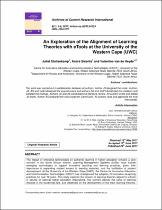| dc.date.accessioned | 2022-09-12T12:59:14Z | |
| dc.date.available | 2022-09-12T12:59:14Z | |
| dc.date.issued | 2017 | |
| dc.identifier.citation | Stoltenkamp, Juliet & Siebrits, André & van de Heyde, Valentino. (2017). An Exploration of the Alignment of Learning Theories with eTools at the University of the Western Cape (UWC). International Journal of Current Research. 8. 1-9. 10.9734/ACRI/2017/34133. | en_US |
| dc.identifier.issn | 2454-7077 | |
| dc.identifier.uri | https://doi.org/10.9734/ACRI/2017/34133 | |
| dc.identifier.uri | http://hdl.handle.net/10566/7866 | |
| dc.description.abstract | The impact of emerging technologies on authentic learning in higher education remains a core
concern in the South African context. Learning Management Systems (LMSs) must include
emerging technologies to support innovative teaching and learning practices, given their
importance in expanding student access to learning materials, and the facilitation of student
development. At the University of the Western Cape (UWC), the Centre for Innovative Education
and Communication Technologies (CIECT) has championed the adoption of innovative eLearning
practices for over 10 years. This study explores the infusion of learning theories aligned to eTools
in service of national higher education imperatives. The authors discuss the value of learning
theories in the eLearning field, and deliberate on the development of the main learning theories.
The study also discusses the application of learning theories in online environments, and this issue
is explored by way of six cases, providing examples of how various learning theories can be
aligned to eTools. These were gathered from CIECT’s marketing blog, which constitutes a
research repository of practitioner experiences and reflections of the institutional LMS and
innovative teaching and learning practices. The aim is to explore and emphasize the importance of
grounding emerging eTools use in theory and pedagogy to promote student development, as well
as the application of learning theories, specifically when designing learning environments to
support traditional teaching and learning practices. The qualitative study is primarily exploratory
and descriptive. It also includes a brief discussion of the results of a student questionnaire (179
respondents from across faculties and departments) exploring how and why students use eTools
at UWC. This exploration of broader student eTools use will help create the foundation for a followup
study to explore the use of learning theories in promoting more focused eTools adoption. | en_US |
| dc.language.iso | en | en_US |
| dc.title | An exploration of the alignment of learning theories with eTools at the University of the Western Cape (UWC) | en_US |
| dc.type | Article | en_US |

